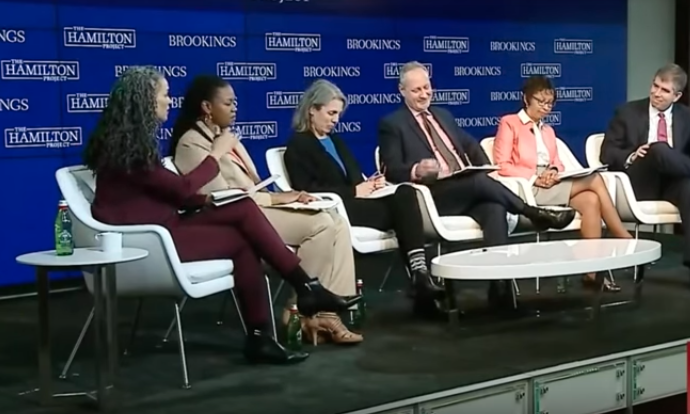Professor Alex Tabarrok with Bartley J. Madden Chair in Economics, Center for Political Economy at George Mason University discusses the role of monetary bail in the United State’s criminal justice system.

This discussion was held on March 18, 2019
Video Transcription (see video below):
“I guess my role on this panel is to be the bad guy. Which Anthony Hopkins says those are the best roles. So, that’s ok. I have two points to make. First of the all, the paradigmatic case for the movement to eliminate cash bail is a person who is innocent, who is wrongly arrested for a minor crime, who rots in jail because he can’t afford bail.
As you pointed out (pointing to the moderator), these cases do exist. We have such cases. They deserve attention. However, they are not paradigmatic.
I want to give you some data from New York City. This is from a paper by Kleinberg Cornell. It covers 500,000 arrests between 2008 and 2013. Thirty-five percent of the arrests were for a violent crime, including twelve percent for murder, rape or robbery. Violent crimes were the single largest category. Drug misdemeanor cases were twelve percent.
Most of the arrested people had prior interactions with the criminal justice system. So, on average, each arrested person had 3.2 prior felony arrests and five prior misdemeanor arrests. Convictions were less than arrests. Which says to me maybe the system isn’t convicting enough though interpretations will obviously differ. Nevertheless, the typical arrested person has been arrested multiple times previously.
Now, given all this, I think actually most Americans would be pretty surprised to find that most people are released. Two-thirds are released off the bat and then more are released when they are assigned bail and they make bail. Now, it is true that quite a few people who are signed a bail don’t make bail. And I’ll come back and talk about those in a minute.
Of the people who are released, given their extensive history with the criminal justice system it’s perhaps not surprising to find that fifteen percent failed to appear on the day of their trial. A whopping twenty-five percent are re-arrested before trial, including 3.7 percent arrested for a violent crime and nearly two percent arrested for murder, rape or robbery.
Now, these are re-arrest rates, which are almost certainly an under-estimate of crime rates. What role does money bail play in this?
Well, first, the people who do not make bail, they’re obviously not a random sample of the people who have been arrested. The people who do not make bail are on average more dangerous. They have twice as many arrests and twice as many convictions. For example, the average defendant who doesn’t make bail has six previous felony arrests and four previous failures to appear. FOUR PREVIOUS FAILURES TO APPEAR – the average.
Now, what’s going on here actually seems pretty obvious to me, is that there is a group of people whose job is crime and when they are arrested and released they go back to their job. And they continue to do this until they are convicted of a crime and spend some time behind bars. So, that’s point number one.
Point number two, I just want to say a brief word on some of my work with Eric Helland on the bounty hunter system, on bail bondsmen. Because most of the people who are assigned bail, they don’t have the cash. So, they borrow the money from a bail bondsman. That gives the bail bondsman a strong incentive to make sure that the person appears for trial. And they actually do this in a lot of interesting and beneficial ways. They remind the people. They call them up. They send a text messages. The bail bondsman is actually an unappreciated help to the defendants – helping them to navigate of the system.
A second, if they do fail to appear, the bail bondsman consults a bounty hunter after the people who fail to appear. And really, the bounty hunters are the only people who systematically go after and bring in people who fail to appear. The bounty hunters are really the long arm of the law. And my colleague and I find that people who are released on commercial bail are twenty-eight percent more likely to show up. And if they fail to show up, they are fifty percent more likely to be caught quickly and to not be at large within a year.
So, my points are really this. To summarize, that when we are talking about a radical measure, such as eliminating cash bail, we need to focus on the paradigmatic, the actual average paradigmatic cases of the people we’re talking about. If we’re eliminating cash bail and we’re going to let some innocent people go. Great! But more often, we’re going to let the guilty people go as well. So, we want to be aware of who we’re talking about.
If we eliminate cash bail, we eliminate the bounty hunter and the bounty hunter is one of the client incentive systems which actually work. And we need to keep that in mind when we’re doing so.


 Serving all of Florida,
Serving all of Florida, 
Recent Comments